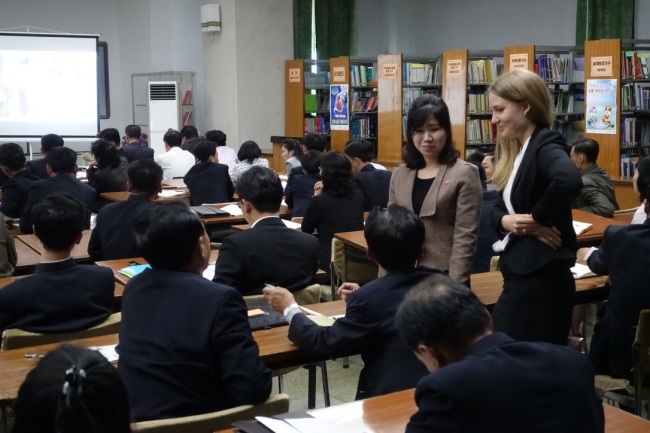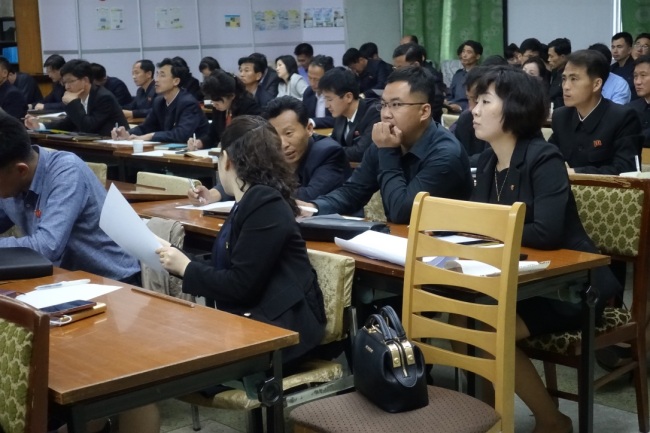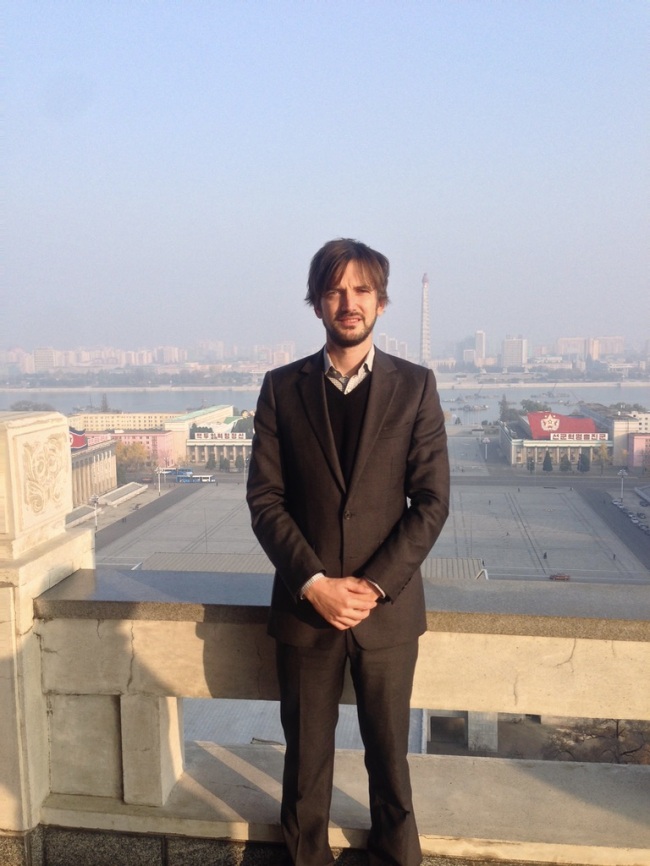North Koreans are upbeat about the economic changes the summit between their leader Kim Jong-un and US President Donald Trump might bring, according to a member of a nonprofit group who was in Pyongyang just last week.
Singapore-based Choson Exchange, which has trained some 20,000 North Koreans in business since 2007, held its latest workshop in Pyongyang last week, focusing on entrepreneurship and startup skills. A record number of North Koreans -- almost 130 -- signed up for the workshop.
 |
North Koreans attend a workshop on startup skills led by Choson Exchange last week in Pyongyang. (Chosun Exchange) |
Ian Bennett, London-based outreach coordinator for Choson Exchange, said the North Koreans appeared more hopeful compared to a month ago.
“With the news of the Pompeo visit, whilst we were there, and the announcement of the Trump-Kim summit date and location, there was a palpable energy about the place,” Bennett said in an email interview with The Korea Herald.
US Secretary of State Mike Pompeo said after his second meeting with Kim in the North Korean capital last week that Washington would agree to lift sanctions on the North if it agrees to completely dismantle its nuclear weapons program.
In a shift from the two-track policy of pursuing economic growth and developing nuclear weapons, Kim announced last month that his country would “concentrate all efforts on socialist economic construction.”
 |
North Koreans attend a workshop on startup skills led by Choson Exchange last week in Pyongyang. (Chosun Exchange) |
Having traveled to the reclusive state 12 times since 2008, Bennett expects to see some of the first economic policy changes in the area of tourism.
“I saw a lot of interest in the development of tourism and special economic zones. Personally, I would expect tourism to spearhead the economic policy changes in North Korea, as there is a great deal of construction work going on near Wonsan now,” he said.
A large beach resort is being built in the Kalma Coastal Tourist Area on the Kalma peninsula in the eastern coastal city of Wonsan in North Korea.
 |
Ian Bennett, Choson Exchange outreach coordinator (Chosun Exchange) |
“Success of the special economic zones will need sanctions to be eased and for foreign companies to have confidence that the North Koreans will not seize assets, and will also require infrastructure improvements,” said Bennett, who is a consultant in the legal technology sector in London.
He started volunteering for Choson Exchange in 2015 after many trips to the North, as he wanted to use his business experience to help people there succeed in their own businesses. He also occasionally works as a tour guide in North Korea with Koryo Tours.
For the three-day workshop held at the Grand People’s Study House, the biggest library in Pyongyang, Bennett found workshop leaders, put together seminar topics and shared them with local organizations that might be interested in the content. He also had overall coordination responsibilities for the trip.
Among the six workshop leaders were a Polish professor from Singapore Management University who talked about networking theory, and a woman from Stockholm who had founded her own startup for laundry delivery.
“The North Korean participants were extremely engaged and interested in real world examples that we shared with them. There were a lot of questions about how the economies work in our countries,” Bennett said.
“They had particular interest and many questions about pricing and cost structures, as well as working with import and export tariffs. A lot of people are keen to start joint ventures, but obviously that is not easy in the current sanctions environment.”
A lot has changed in the North in the 10 years since Bennett’s first visit to Geumgangsan as a tourist crossing over from South Korea.
“In addition to the change in leadership, there have been an increasing acceptance of markets, changing fashions, more construction and development, and more reliable electricity especially in Pyongyang,” he said.
“We see a lot of small businesses developing. One example is two ladies who came to one of our workshops a few years ago and got the idea to start a coffee shop. They made this a reality, and the Geumrung coffee shop is now operational and serving barista-standard coffee in Pyongyang.”
Around 40 percent of the North Korean participants in Choson Exchange workshops have been women, as the group runs a “Women in Business” program.
The group plans to hold two more workshops in the North this year -- one on business management in August and another on startup incubation in November.
By Kim So-hyun (
sophie@heraldcorp.com)






![[Newsmaker] Moon’s security adviser continues marching to a different beat](http://res.heraldm.com/phpwas/restmb_idxmake.php?idx=605&simg=/content/image/2018/05/17/20180517001038_0.jpg)







![[Today’s K-pop] Blackpink’s Jennie, Lisa invited to Coachella as solo acts](http://res.heraldm.com/phpwas/restmb_idxmake.php?idx=644&simg=/content/image/2024/11/21/20241121050099_0.jpg)